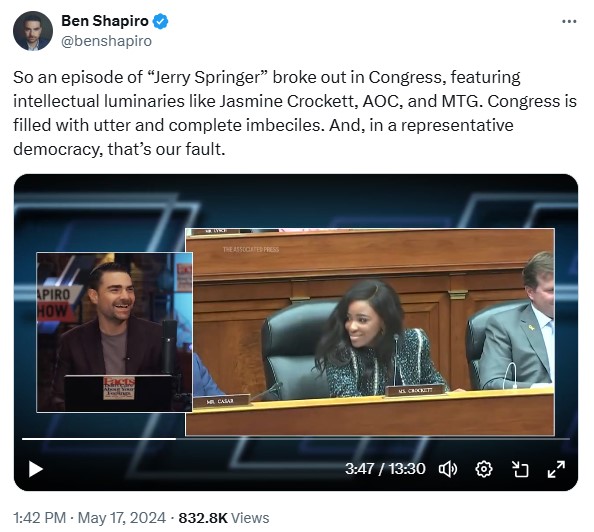The New York “justice” system may or may not jail Donald Trump, but the impression Democrat partisans are giving is that the entire charade of a trial was meant primarily to produce the label, “convicted felon.” This marketing ploy, as Roger Kimball notes, may not be working: “It’s my sense that the effort to weaponize the word ‘felon’ in the campaign against Donald Trump is failing miserably.”
On the conservative side, we do, I sometimes think, attribute too much conspiratorial competence to people we believe unable to manage even small municipalities or businesses. One should expect error from those who deny reality. Nonetheless, money and power can cover for managerial inability for a time, and civilizational destruction can be the result. The Left has accumulated much of both money and power for itself, and I worry the attacks on Donald Trump represent the last stage before all-out tyranny.
An earlier step was to conquer the nation’s institutions — particularly those in which reality is of minimized immediate relevance — from education to media to legislatures to churches. Thus far, however, the need for people to believe the institutions continue to function as intended has placed a restraint on their activities. The Rhode Island General Assembly still has hearings, although they’ve been performative at least for the two decades I’ve been watching them, and public schools have still claimed (although not proven) that the basics of math, reading, and science are central to their mission. Until recently, the news media still attempted to appear unbiased and willing to give a fair shot to all sides.
As corrupt as they’d become ten or twenty years ago, the need for continued popular faith in America’s institutions provided incentive for their conquerors to stay within bounds, because the power of the institutions derives from people’s willingness to engage with and work through them. That balance is what keeps both tyranny and anarchy at bay.
With respect to lawfare, the boundary had previously been the unjust use of the justice system to force people through a painful process that is, itself, the punishment even when the target “wins.” The institution was still working, ultimately, when the course had been run. Turning Donald Trump’s status (for the time being) as a “convicted felon” into a marketing slogan rubs the public’s face in an abstraction that only exists within the institution; there is no physical status of “felonious” that could be tested outside of a manmade set of laws. Thus, not only the process, but the outcome (the institution) has become “unjust.”
To be sure, the process is not fully complete, and the result for Donald Trump may be reversed on appeal, but the political use of the label, “convicted felon,” has exposed the rot within the institution and reduced trust in fairness. Reversed on appeal, its politicized nature will be undeniable, and half the nation will no longer trust its courts. We see a similar effect as the prescriptions that “health experts” offered during the COVID pandemic turn out to have been overstated, wrong, or even inverted, particularly as the same political party seeks to profit from their ripples, such as the upward swing of the economy from pandemic to just-about-normal.
If the population suspects public health officials are projecting unjustified confidence in society-altering mandates, individuals will heed them less. If people no longer believe elections are legitimate, they’ll seek other means to control their communities. If the justice system no longer gives prosecutions a sense of justice, then tyrants will dispense with the process’s delay and risk and go straight to conviction, while citizens will take matters into their own hands.
As such reactions become more common, our incompetent managers will use their money and power in ever-stronger ways to clamp down, because maintaining control has become an existential imperative for them. Whether the worst of the showdown can be avoided at this late hour, I don’t know, but we can still have hope in Americans’ sense of right and wrong… if we can make clear what is happening.
Featured image by Justin Katz.
[Open full post]This is a belated acknowledgment that Ben Shapiro is exactly right about the Jerry-Springer-esque catfight in Congress last month:
If we don’t like what we’re seeing in Washington, D.C., the only durable solution is to ensure it isn’t representative. But just like the brawls on that famous gawker show, untangling ourselves from this mess is not as easy as stepping away.
[Open full post]On WNRI 1380 AM/95.1 FM, John DePetro and Justin Katz discuss:
- Business-poaching from state to state
- The unlikelihood of Washington Bridge accountability
- Providence city government looks for a role in Brown-Lifespan
- Republican campaign finance woes
- Baldelli-Hunt poll
- Don’t believe demands to not believe your eyes in national politics
- The continuing paneling of Bob Walsh
Featured image by Justin Katz using Dall-E 40 and Photoshop AI.
[Open full post]On Thursday, Governor Dan McKee appeared on The News with Gene Valicenti for an “Ask the Governor” segment on WPRO. (No podcast to link to.) During the segment, while rattling off accomplishments of the just-passed state budget, Governor McKee said
… nursing homes, which we basically have saved …
An interesting statement. In fact, six nursing homes in Rhode Island have closed since 2020 and a seventh, the well-rated Linn Health & Rehabilitation, announced about a month ago that it would be closing. Add to that three that declared bankruptcy in 2023.
In a call to the Tara Granahan Show on WPRO that same morning, Richard Gamache, CEO of Aldersbridges Communities, the non-profit parent company of Linn Health & Rehabilitation, clarified what the governor and General Assembly had done – added $10M for nursing homes to the state budget effective July 1 – and the impact.
It’s not enough to save – I mean, it’s like, it’s something and I’m sure nursing homes, everybody’s grateful for it. But it’s certainly not enough to save.
Gamache elaborated,
Those are the three things that the governor did. Suspending the fines, $10M ARPA funds in the budget and then the re-array October 1. But all of those things are too little too late. And I know that, from conversations with my peers, Linn is not going to be the last nursing home to give notice; that there are others that are on the brink and that this is going to continue. We will continue to see the collapse of post-acute care in the state of Rhode Island. We don’t prioritize elder care and we have a high percentage of elders in Rhode Island. And we have to …we need to think of ourselves as, we could be a model here in the state of Rhode Island. There are things we could do and change the system, become a model. But right now, post acute care is a mess.
In an August op-ed, Matthew R. Trimble, President & CEO of Saint Elizabeth Community, supplied the hard numbers for Rhode Island’s nursing homes which confirm the trajectory that Gamache warns about.
The cost of providing care rose 30% between 2019-2022, according to our estimates. During that same time, Medicaid reimbursement rates rose only 4.7%.
Meanwhile, on the state spending front, Rhode Island officials are pressing ahead at this point with state participation in, as well as re-directing federal funds to, an absurdly expensive residential conversion project in Providence and a non-essential (understatement) sports stadium in Pawtucket with a price tag marked up 500% due to interest.
These are the more high profile but certainly not the only instances of dubious state spending; e.g., why does the replacement to the Washington Bridge have to be an epic bridge of a lifetime, to paraphrase Governor McKee, with double the lifespan? Wouldn’t a regular, serviceable bridge do us just fine? Less costly and faster to build. And is every state-dollar-funded item in the just-passed budget more important than a home and care for beloved seniors?
Important to note that the quizzical spending and non-spending raised in this article is not solely on Governor McKee. It is very much a joint effort by the governor, the Speaker of the House, the Senate President and every Rhode Island legislator who voted for it. Additionally, nursing homes bear higher operating costs as a result of stepped up state mandates from the COVID era, as Matthew Trimble alluded to. Are all of these necessary now that the COVID-19 pandemic is over? Should these perhaps be looked at as part of a larger, though definitely not the entire, solution?
The featured image is of a bake sale that the residents of Linn Health & Rehabilitation held in December to try to save their care facility. Fast forward to Thursday; Gamache informed Granahan during their conversation that the last resident of Linn had been transferred on Wednesday.
To recast the expression slightly, Rhode Island needs to head to a place where nursing homes are properly funded and sports stadiums and profligate residential re-developments have to hold a bake sale. And we need to head there quickly. Contrary to his assertion Thursday, Governor McKee and the General Assembly have not saved Rhode Island’s nursing homes. In fact, the domino effect on nursing homes of their inaction has started.
Featured image: the bake sale held in December by residents of the now-closed Linn Health and Recovery. From Linn’s website; re-printed with permission.
[Open full post]On WNRI 1380 AM/95.1 FM, John DePetro and Justin Katz discuss:
- McKee Antoinette’s budget cake
- David Place gets Magaziner’s game
- Miller not running
- What’s behind incumbent withdrawal
- A new corrections head, despite “controversy”
- Gun control theatrics
- The AG gets millions
- Money wasted on billboards
Featured image by Justin Katz using Dall-E 40.
[Open full post]On WNRI 1380 AM/95.1 FM, John DePetro and Justin Katz discuss:
- Ethics Commission roped into corrections head appointment
- RI pols love the American Revolution pose
- Comparing “Appeal to Heaven” with the keffiyeh
- McKee’s gun pandering
- e-Bike politics
- Ruggerio back in the building
- Police and BLM politics
- Teacher union gets an all-good from the Ethics Commission
Featured image by Justin Katz using Dall-E 40 and Photoshop AI.
[Open full post]I’m a little delayed in reacting to this, but it isn’t encouraging news:
State Rep. Patricia Morgan, who is one of two Republicans running in Rhode Island’s U.S. Senate race this year, has declined to debate her opponent in the primary, 12 News has learned. …
“We need our party united for when Ray drops out or loses in the primary come September. A debate between Patricia and Ray would, mostly likely, not center on policy differences, but would instead center on personal traits and accomplishments,” [Morgan Director of Communications Anthony] D’Ellena explained.
That’s a thin “explanation.” RI Republicans aren’t really in a position to reinforce the notion that front-runners don’t have to debate. More importantly, they can’t afford not to increase interest in their campaigns or give their base a feeling of real activity.
Morgan’s making a big mistake, here.
[Open full post]On WNRI 1380 AM/95.1 FM, John DePetro and Justin Katz discuss:
- Questions not raised about Matos signature controversy
- $14 billion state budget
- Pension fund set to take a hit
- The reason for DiPalma’s new gig
- Citizens Bank looks for a handout
- National hypocrisy about the integrity of the judiciary
Featured image by Justin Katz using Firefly.
[Open full post]Two things occurred to me when I saw this aerial video of a wind turbine blade graveyard in Texas:
First, this sort of thing already exists for 20-year-old turbines in an industry that is supposedly just getting started as a major industry. What sort of acreage will we be talking as we approach the “net zero” fantasy?
Second, we should store this junk under the ugly solar farms for which we’re leveling forests. At least then the ugliness will be consolidated.
[Open full post]I’m tempted to modify this message, just a bit, by suggesting that this is always the choice:
[Open full post]










